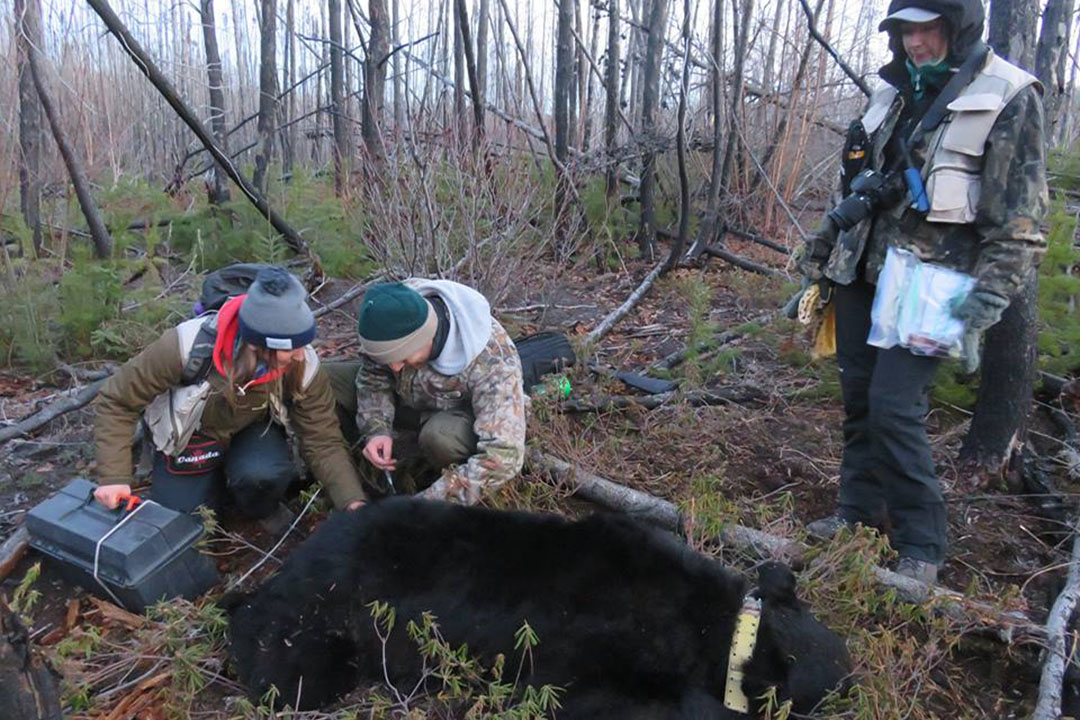
Collaring black bears best part of student’s science studies
If you ask Branden Neufeld about the best part of his Bachelor of Science studies, he will give you an interesting answer: collaring black bears in Saskatchewan’s Boreal Shield.
By Shannon BoklaschukNeufeld will receive his new science degree during the University of Saskatchewan Spring Convocation on June 5. On June 4, the evening before he is set to walk across the stage at the convocation event at TCU Place, he will also receive the award for Most Outstanding Graduate in Environmental Biology during the College of Arts and Science’s Convocation Dinner and Ceremony.
“The best part of this degree was my summer fieldwork for my honours project,” said Neufeld, who was raised in Hague, Sask., as he reflected on his recent undergraduate studies.
“We went up north to the Wollaston Lake area to capture and collar 24 black bears. This is part of the Saskatchewan Boreal Black Bear Project. I also enjoyed scouting out black bear dens and the helicopter survey for caribou.”
As part of his work with the university's McLoughlin Lab in Population Ecology, Neufeld helped equip black bears with GPS collars. Neufeld and his colleagues sat in ground blinds or tree stands and tranquilized the animals before they were able to collect hair and blood samples and pictures of the animals’ teeth and put on the GPS-locating collars.
“This collar sends location data every five hours, which can be analyzed from the lab,” Neufeld said. “For my honours project, I pinpointed den locations to study the features in the den area that black bears selected.”
Although the Bachelor of Science degree is new for Neufeld, the U of S isn’t. He previously obtained a Bachelor of Arts degree (honours) in English from the College of Arts and Science in 2012 and a Bachelor of Education degree from the College of Education in 2015.
Neufeld’s undergraduate degrees may have differed from each other, but he has had positive experiences each time he has studied at the U of S.
“I love meeting people and making friends in my classes, even if our paths rarely cross again. I have had many great instructors across many disciplines and I love learning, so there really is no better place for me to be,” he said.
Neufeld was working as a substitute teacher when he decided he wanted make a change in his life and study science. He said his “increasing love of nature” helped him choose the field of environmental biology.
It was the right choice for Neufeld, who has enjoyed working in the lab of Philip McLoughlin, a professor in the Department of Biology in the College of Arts and Science.
“The McLoughlin lab is great for fieldwork. I do not mean to say that other labs do not have great fieldwork, but ours is very exciting,” said Neufeld. “I barely knew Phil McLoughlin when we left for the trip, and then we were darting bears and making jokes. One time, we had three big males tranquilized at once and my job was to guard him while he quickly took samples and put on collars. We also have a great group of people working in the lab. Phil McLoughlin is a lot of fun and I have made many friends working in the lab.”
Neufeld said the lab has several other projects on the go, including a population study on the feral horses of Sable Island, a crescent-shaped sand bar located 160 kilometres off the east coast of Nova Scotia. Neufeld has also worked on the Saskatchewan Boreal Caribou Project, which looks at survival and predation of boreal caribou.
“The work on the boreal caribou project is important for conservation. If we know what habitat caribou are selecting, this habitat can be protected to ensure the survival of the species,” he said. “It also studies the effects of predation by wolves and black bears, which likely have significant impacts on the species’ survival.”
Neufeld plans to continue working and studying in the area of environmental biology. He has already started graduate studies at the College of Arts and Science, where he is examining caribou-moose-wolf relations within Saskatchewan.
“For grad studies I am continuing in the McLoughlin lab,” he said. “My focus will be on wolves in the province. This is likely to include data from the boreal wolves already collared and potentially wolves further south as well. More specifically, I will look at wolf-moose relationships, including how the abundance of one affects the other, and how high populations of them can impact dwindling caribou within the same area.”

